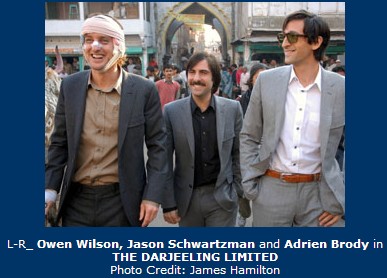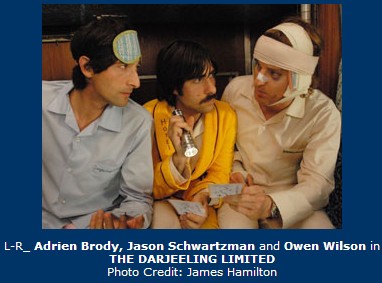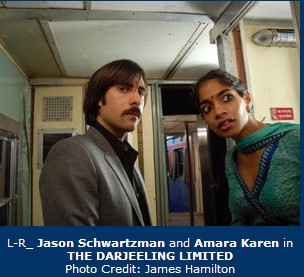By: debbie lynn elias

With the exception of “The Royal Tennenbaums”, I have never been a big fan of writer/director Wes Anderson and his kitschy, predictable, cookie cutter, at-odds-familial-discord films with best friend Owen Wilson and Bill Murray firmly attached to his hip. Although his films have enjoyable and entertaining moments, they are rather linear, and after five films, clearly limited, giving pause to the belief that Anderson is perhaps a two trick pony, merely running the pony back and forth on the same set of tracks. THE DARJEELING LIMITED is no different. However, Anderson’s consistent use of eye popping color, ornate detailing and visual acuity compels, no, forces one to keep watching. That is the key to his faithful following.
Francis, Jack and Peter Whitman are brothers at odds. Not having spoken since their father’s death one year ago, their lives have gone in separate directions with separate and distinct differentiation and purpose. Their mother, Patricia, abandoned them years ago. Heeding a spiritual calling from above, she left the boys and moved to a mountain top convent in the Himalayas becoming a nun, bringing Christianity to the Third World populus.

Suffering with his own anxieties and a compelling need to restore and renew the closeness of youth with his brothers, Francis, the eldest and very wealthy and well-to-do, connives Jack and Peter to join him a train trip through Rajasthan, India. Claiming undying love and loss after his near-death motorcycle accident, Francis manipulates Jack and Peter with vows that they were all he could think of when he “went to the light.” Picking up the tab, choreographing every minute of every day, Francis has his own spiritual agenda, culminating in a visit to their mother, a fact which he neglects to mention to his siblings. Jack, the youngest and fresh off a break-up with his girlfriend, is obsessed with checking her answering machine, the retrieval code for which he just happened to pick up by some unscrupulous means. A writer, he bases all of his “fictional” characters and stories on the people and events in his own life and doesn’t even bother to change the names to protect the innocent. On the other hand, middle child Peter is running away from the responsibilities of life and his wife, who is giving birth any day to their first child. Always believing he would divorce this woman and not be together “til death do us part”, he is confused as to what to do and uncertain as to whether he should be happy or sad over impending fatherhood. He also appears to be transforming himself into their dead father having absconded with many of dear old dad’s personal effects, including eyeglasses and car keys, all of which Francis argues should be part of the “Estate” and shared by them all.

Reuniting on a train called The Darjeeling Limited, the three embark on their journey. Slowly rekindling their brotherly love, they each act like little children, pairing off and pitting each against the other with little secrets and digs. Initially Jack and Peter align against the dictatorial Francis, but as their trip progresses, allegiances shift back and forth faster than mean spirited high school girls chasing the same boy and title of prom queen. And as to be expected, surprises, stupidity, sadness and tragedy are the watchwords of the entire trip.
In a chillingly prescient turn, Owen Wilson plays the suicidal Francis. As with all of his roles in Anderson films, Wilson is quirky, gregarious and garrulous, seeming as if fighting for the most screen time and most attention. Normally eye candy for the female audience, sadly here, we miss out on his undeniable cuteness and affability because of the character’s bandages. Jason Schwartzman, also no stranger to Anderson films, tackles the heartbroken obsessive Jack, bringing a somber and almost wimpy sickening quality to the role, which is precisely what makes the character work in the sibling rivalry department. Adrien Brody, rounds out the trio as Peter. And although he has a nice meld with Wilson and Schwartzman, his depth and talent as an actor is not utilized to its full advantage.

Natalie Portman makes a very disjointed cameo appearance as Jack’s ex-girlfriend. For those of us fortunate enough to attend a pre-release screening, the companion short film “Hotel Chevallier” sets the stage of her relationship with Jack, which in and of itself is so true to life and soooo believable. It’s a shame the short won’t be shown in the theater as it is wickedly entertaining. Anderson’s other two stalwarts, Angelica Huston and Bill Murray, also join in the journey. Huston is a delight as the AWOL mother turned, as she describes it, “action hero nun.” A departure from most of her matriarchal roles, despite limited screen time, it’s well worth the wait for her no-nonsense performance. And what would an Anderson film be without Bill Murray. Opening the film in a montage as a harried businessman trying to catch The Darjeeling Limited, he provides a time and space footing for the film.
Written by Anderson, Roman Coppola and Jason Schwartzman, the story draws on Anderson’s patented familial discord with some undisputable charming real life moments written into the story. Drawing on their own individual life experiences, each brings nuanced elements to each of the Whitman brothers, which unfortunately fall short of coming to fruition thanks to a rather broad brush styling of writing. There is no depth and the inferences and impressions of each character is superficial, never quite reconciling the interdependency of the sibling rivalry and purpose of the trip as cohesive elements to the structure. And the concept of “personal growth” really falls by the wayside.

Where Anderson excels though is visually. With great attention to detail, he paints a meticulous portrait of India, all contained within the train itself. Actually taking a 10 car train, disassembling and reassembling each car customized for the shoot, Anderson, together with production designer Mark Friedberg, spared nothing with production design. India’s caste system is visualized within the cars of the train and life is captured in intimate one-on-one settings. Thanks to Art Director Adam Stockhausen and Graphic Artist Mark Pollard, the train itself is vibrant and colorful, showcasing the beauty of handmade Indian artistry blending Rajasthan-styling with Art Deco influences.
Anderson directorial hallmarks are ever present with montage and side-to-side pans and heavy use of over-the-shoulder shots to establish the intimacy of conversation. Thanks to brainstorming and the inventively creative cinematographer Robert Yeoman, ceiling dolly tracks were installed inthe train in order to run cameras without interfering with action in the aisles. Lighting was built into the train decor itself. Also, the exterior of train was outfitted with cameras and rigging that had to be compact enough to stay within 3 feet of the train exterior on either side due to the treacherous mountain passes traveled. Wanting to shoot as organically as possible, exteriors were shot with a randomness in open marketplaces amid casual citizens. Saturating the story with the culture and beauty of India, Anderson even turned to music from Satyajit as a backdrop to the picturesque acumen of the film.
Visually pleasing and interesting from the perspective of seeing a mini-travelogue of India, THE DARJEELING LIMITED is ride worth taking. However, if you are looking for substance over style, this is one trip you shouldn’t take.
Francis Whitman – Owen Wilson Peter Whitman – Adrien Brody Jack Whitman – Jason Schwartzman
Directed by Wes Anderson. Written by Anderson, Roman Coppola and Jason Schwartzman. Rated R. (91 min)











